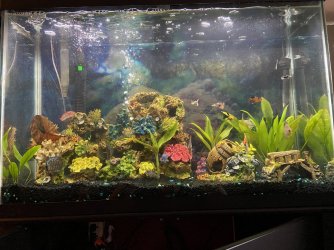I am planning on upgrading to a larger tank in a couple of months, prolly in November. Maybe a 70 or 80 gallon tank. I do use plant fertilizer, it’s called flourish by seachem. I stopped using it though since it created a lot to algae in the tank. I would like to have more plants but that one’s I have haven’t been doing to great. Hence why I bought the flourish by seachem. Also, I have another 15 gallon tank that I am going to use for the guppies. I will definitely do they 75% water changes for the week, but 75% water changes every week necessary? I usually do 30%, 75% sounds like a lot
On the water changes, there is plenty of science behind this. Changing close to 70% once each week is minimal. Now, with very few fish and with tons of plants, this can be modified--maybe--but there is still no doubt that the more water changed the healthier the fish will be. There is no filter that can do as much, no matter the size, type or how many; and depending upon the fish load, plants are very limited in their ability to deal with this. There is "stuff" in the water that simply must get removed.
I recall reading some years back that six black neon tetra in a well planted 55 gallon tank could get by with no water changes because the plants would be able to handle the "stuff" that six little fish produce. Most of us have more fish than this.
Discus breeders often change 90-95% of the water in their fry grow-out tanks once, twice, some even three times each day. The fry grow faster and are healthier. That alone shows the benefits of water changes.
Previously the water was perfect. 0 nitrate, 0 nitrite, 7.0 ph, alittle less then 40 ppm kh and my gh is alittle less then 30ppm. Everything has remained the same but the nitrate
I will assume tap water is zero nitrate from this. So that indicates that the water changes have not been adequate. Stocking and feeding also factor in of course; others have mentioned the incompatibility of what is in the tank, and aside from even the basic biological load of the fish mass, the issues surrounding the non-compatibility also impact the biological system. This is because fish under stress have a stronger impact on the system. Fish interact chemically, something we cannot see or measure (test for) and only water changes deal with this. The more you feed the fish the more comes out obviously; as an example, even feeding twice a day compared to once will double the impact on the system. Water changes, fish numbers and compatibility, fish feeding, and cleaning the filter/substrate all factor in when it comes to nitrate.
Another factor is number of shoaling species; here again having too few, even more than too many, can cause trouble for the system. Angelfish and discus are shoaling species. They need groups of five or more, except for a bonded pair for breeding. This too is impacting the biological system.


